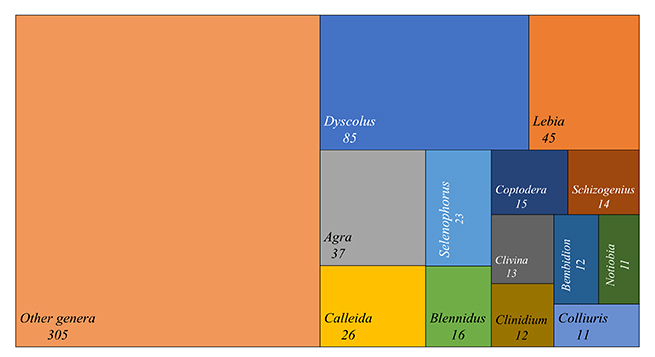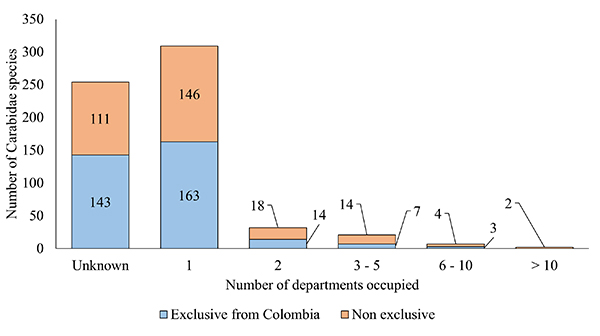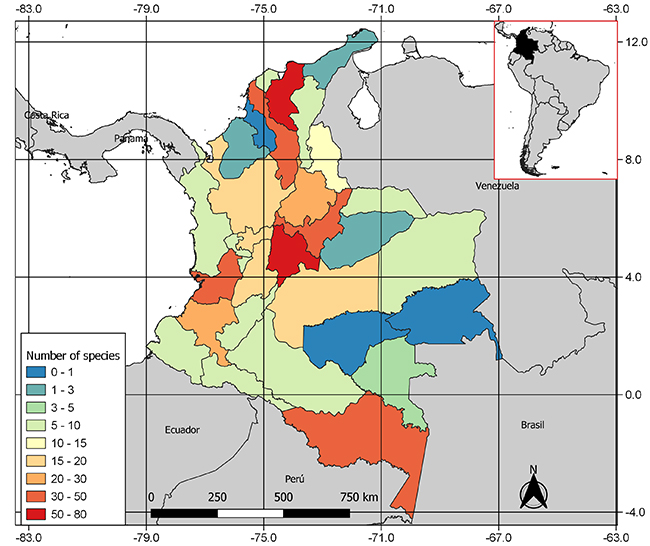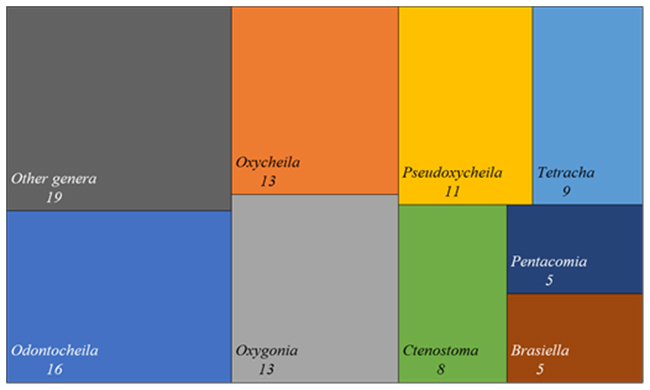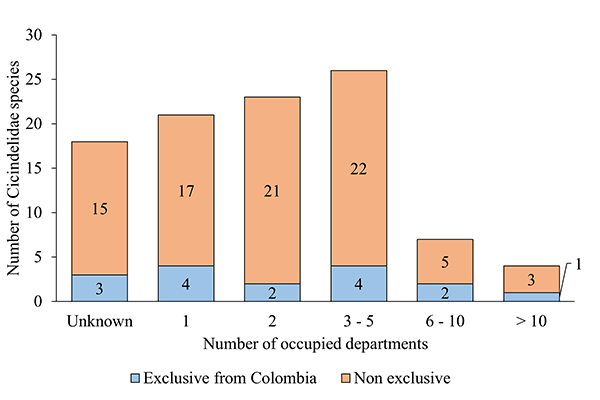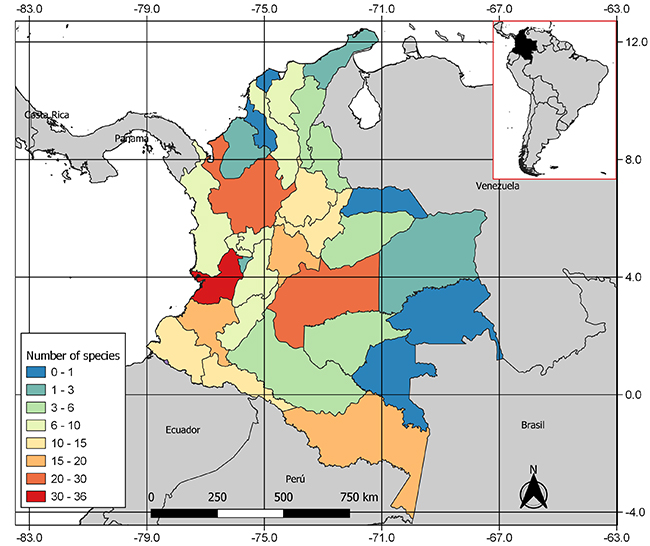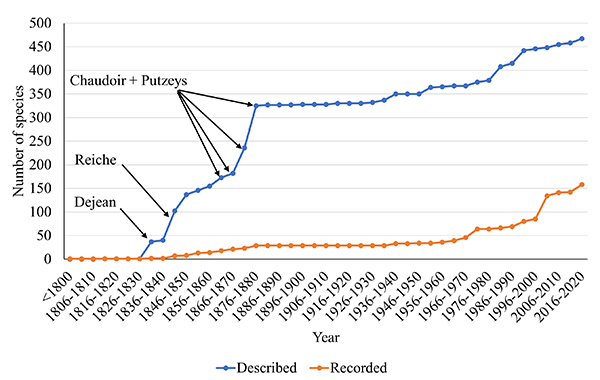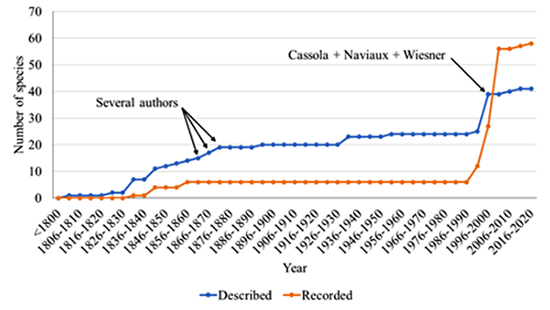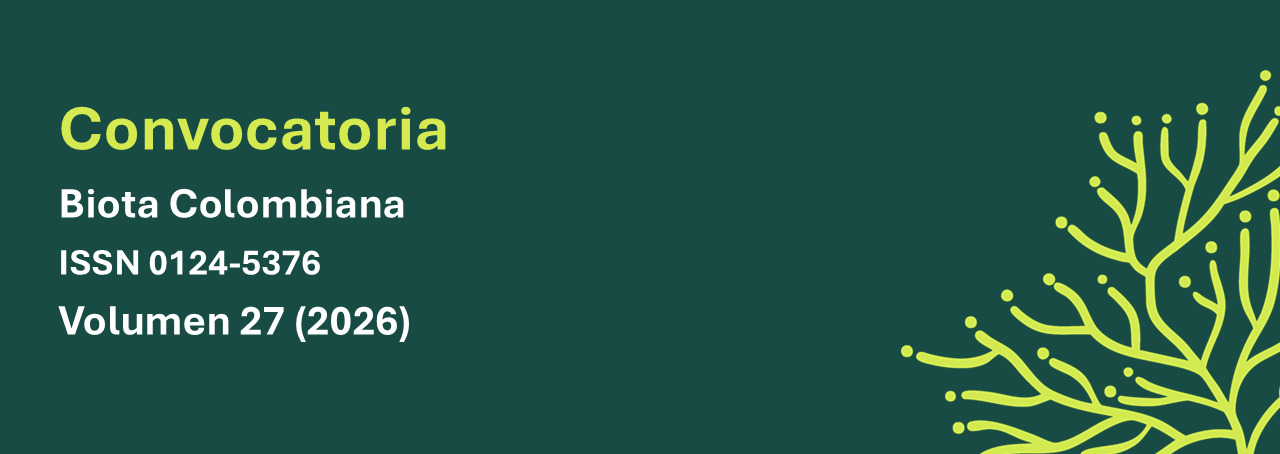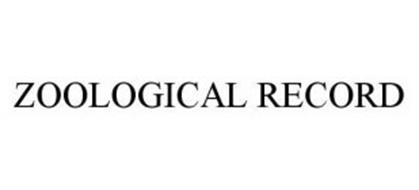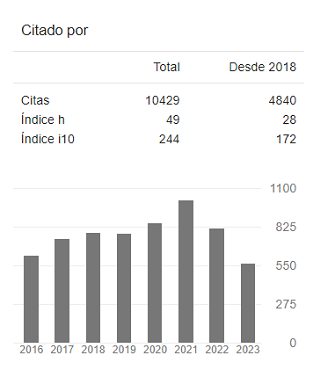Recibido: 7 de abril de 2021; Aceptado: 28 de junio de 2021
Abstract
The beetle families Carabidae and Cicindelidae, with about 40 000 species worldwide, play an increasing role in biodiversity conservation and ecological studies in Colombia, which makes a faunistic update all the more necessary. We present and analyze a checklist of the species so far described or registered from Colombia until 2020, based on published studies, and their distribution data at the department level. Carabidae are represented by 625 species and Cicindelidae by 100. Magdalena, Cundinamarca and Valle del Cauca are the departments with the highest record numbers of Carabidae, while Cicindelidae are most frequently cited from Valle del Cauca, Antioquia and Meta. The greater sampling effort in these regions is likely due to the accessibility of their natural areas from the main towns. The geographical distribution of Cicindelidae is better documented, with only 17 % of the species without mention of specific localities within the country, against 40 % in Carabidae. Hyper-diverse regions, such as the Chocó and the Amazon, are underrepresented. The number of species currently recorded is therefore estimated to be much lower than true diversity for both families.
Key words:
Biodiversity, Faunistics, Ground beetles, Species list, Tiger beetles..Resumen
Las familias Carabidae y Cicindelidae, con cerca de 40 000 especies a nivel mundial, tienen un papel creciente en estudios de biodiversidad y ecología en Colombia, lo que hace necesaria una puesta al día de los conocimientos sobre su diversidad. Presentamos y analizamos la lista de las especies descritas/registradas en Colombia hasta 2020, con base en estudios publicados, y sus datos de distribución a escala de departamento. Los Carabidae están representados por 625 especies y los Cicindelidae por 100. Magdalena, Cundinamarca y Valle del Cauca presentan los mayores números de registros de Carabidae, mientras que para Cicindelidae son Valle del Cauca, Antioquia y Meta. Probablemente, el mayor esfuerzo de muestreo en estas regiones se debe a la accesibilidad de sus áreas naturales desde las principales ciudades. Los Cicindelidae se benefician de más registros de localidad, con solo 17 % de las especies sin mención de localidad específica en el territorio nacional, contra el 40 % en Carabidae. Regiones hiperdiversas, como el Chocó y la Amazonía, están subrepresentadas. Por consiguiente, se estima que el número de especies actualmente citadas es muy inferior a la diversidad real de las dos familias.
Palabras clave:
Biodiversidad, Escarabajos del suelo, Escarabajos tigre, Faunística, Lista de especies..Introduction
Geadephaga, the group of terrestrial Adephaga formed by Carabidae (ground beetles), Cicindelidae (tiger beetles) and Trachypachidae, with about 40 000 described species worldwide, represents nearly 10 % of the species so far described in the order Coleoptera (Bouchard et al., 2017; Lorenz, 2017). Within this monophyletic group (López-López & Vogler, 2017), the position of tiger beetles is still under debate, whether as Cicindelidae at family rank (López-López & Vogler, 2017; Duran & Gough, 2020) or as Cicindelinae within Carabidae (Gough et al., 2019; Li et al., 2020). In this study, we provisionally placed tiger beetles at family rank without prejudice to future advances in genomic studies, because in most studies they have been treated separately from ground beetles. Trachypachidae, on their part, are not represented in the Neotropics.
Carabidae and Cicindelidae are present in almost every possible ecosystem worldwide (Lövei & Sunderland, 1996), with a great diversity of life history traits, and frequently used as bioindicators in ecological studies (Rainio & Niemelä, 2003; Pearce & Venier, 2006) or as control agents against agricultural pests, due to their predatory habits (Kromp, 1999; de Heij & Willenborg, 2020). Therefore, their knowledge can be crucial in studies on sustainable agriculture, or on assessment of vulnerable natural areas.
Information on Geadephaga of Colombia has been synthetized in two studies more than fifteen years ago: one by Vítolo (2004) on Cicindelidae, and another by Martínez (2005) on Carabidae. Vítolo (2004) offers data on morphology, distribution in Colombia, identification keys, and a summary of the diversity of tiger beetles in the country. Martínez (2005) provides identification keys with full habitus illustrations for all the genera present in Colombia. As the main objective of the latter study was to allow identification at the genus level, the information on the distribution of taxa was also limited to genera. Moreover, the list of species in Martínez (2005) needs revision in three aspects: some species cited from Colombia in the scientific literature were not included, the presence in Colombia of other species is stated without references, and a few unnamed morphospecies are listed, which hinders a correct evaluation of the total number of species cited from Colombia. As a complement to these fundamental works, Moret (2003) published an identification key to the Carabidae of the Andean paramo which includes southern Colombia, but it is also limited to genera and does not provide any distributional information.
In Colombia, the uncertainty about the identity of many species (Linnaean shortfall) and their spatial distribution (Wallacean shortfall) are the greatest obstacles to develop robust ecological studies (Hortal et al., 2015). In addition, poor taxonomic and faunistic knowledge limits the potential assessment of the ecosystem services that these beetles could provide. Parataxonomy (i.e. the assignation of individuals to morphospecies based on their external appearance, without considering neither taxonomic literature nor the specialists within the group), as an alternative way to overcome the taxonomic impediment in ecological studies, appears to be an unsatisfactory solution, since it tends to overestimate the number of species and does not guarantee reproducibility (Krell, 2004).
The knowledge of Colombian Geadephaga has increased in recent years, due to a growing number of taxonomic (e.g. Arenas-Clavijo, 2017; Forero et al., 2019; Moret, 2019; Sarmiento-Roa et al., 2020) and ecological studies (e.g. Arenas & Armbrecht, 2019; García-Suabita et al., 2019) based on this group during the last decade. An update of the current taxonomic and faunistic knowledge was therefore necessary, as a starting point for future systematic revisions of the tribes or genera which might deserve special attention from a biogeographical or ecological point of view.
For these reasons, the present study aims to list the Carabidae and Cicindelidae species recorded from Colombia in the literature, up to 2020, thus offering a current state of knowledge of these two families, emphasizing gaps and biases. It also seeks to provide information on areas of potential interest, where it would be convenient to intensify, complete or initiate samplings of these ecologically important beetles.
Material and methods
Bibliographic database
A total of 150 studies published up to 2020, related to ground and tiger beetles of Colombia, was obtained from an exhaustive search that included documents from the 19th century. Much of this literature is available in electronic repositories (e.g. Biodiversity Heritage Library, Gallica, Persée), and a smaller portion was gathered by direct request to libraries or authors. The reviewed publications cover the following topics: (1) descriptions of new species based on material from Colombia or, in the mid-19th century studies, from “Nueva Granada” or “Nouvelle Grenade”; (2) new Colombian records of species already described from other countries; (3) lists of species of a genus or of a supra-generic taxon in systematic revisions; and (4) ecological studies or biodiversity inventories. Regarding the last category, doubtful attributions marked as “cf.” or “aff.”, as well as morphospecies designated by a number, were not included. Based on this inventory, the references of all the species listed by Martínez (2005) were verified (Appendix 1), and a new checklist was produced.
Construction of the checklist
Once the references were compiled, a list was constructed in which species are sorted by genus. Infraspecific taxa were excluded from the list. Generic and subgeneric names were updated in accordance with Lorenz (2017) or based on the last available systematic revisions. In the case of synonyms or debated generic attribution, we followed as a general rule the taxonomic decision of the most recent revision, the reference of which is given in the bibliographic section of the list (Appendix 2, last column). Locality information is limited to the “Departamento” (department or province), and only published localities were taken into account.
Data analysis
The checklist was used as a database to build graphs and maps to better understand the current state of knowledge of the group in Colombia. These graphs are based on the description year or on the year of the first record for each species, on the number of species per genus, and on the number of species per department.
Results
Carabidae
Based on published data, the family Carabidae is currently represented in Colombia by 625 species -close to 1.7 % of the world total-, arranged in 10 subfamilies, 32 tribes and 125 genera (Appendix 2). Of the recorded species, 330 (53 %) have not been reported from any other country, so that could be considered Colombian endemics, at least until they do not get recorded from any surrounding country. Thirteen genera account for 50 % of the species, the most speciose genus being DyscolusDejean, 1831 (Harpalinae, Platynini), which contains 14 % of the total (85 species) (Figure 1). Forty-seven genera (38 %) are represented by a single species in Colombia (Table 1), five of which are monospecific, with records of their unique species in at least another country: Stenocheila (Harpalinae, Lachnophorini); Askalaphium (Harpalinae, Ctenodactylini); Enceladus (Siagoninae, Siagonini); Homalomorpha (Harpalinae, Cratocerini) and Trichognatha (Harpalinae, Galeritini) (Martínez 2003, 2005; Martínez & Ball, 2003; Lorenz, 2017). Three genera are only known from Colombia: Callidadelpha (Harpalinae, Lebiini), Cryptomma (Scaritinae, Clivinini) (without specific locality recorded) and Columbitrechus (the latter, most likely a synonym of Paratrechus). Finally, two introduced species have been registered: Laemostenus complanatus, from northern Africa and/or western Europe (Martínez, 2005), and Mochtherus tetraspilotus, from southeastern Asia (Torres-Domínguez et al., 2020).
Figure 1: Number and proportion of species by genus of ground beetles recorded from Colombia
Table 1: Structure of the subfamilies and tribes of Carabidae Latreille, 1802 in Colombia. In parentheses: number of genera with only one species recorded in the country.
Regarding species geographic distribution, 254 species (~41 %) are known from the country as a whole without more precise localities, from which 143 have not been cited from any other country; 371 species (~59 %) have at least one specific locality record. 309 species are known from a single department (Figure 4), and 163 of these are exclusive to Colombia. The departments with the highest number of recorded species are: Magdalena (79), Cundinamarca (75) and Valle del Cauca (43), while Guaviare, San Andrés y Providencia and Sucre have no records for the family (Appendix 1, Figures 2 and 3).
Figure 2: Number of ground beetle species per Colombian departments.
Figure 3: Number of ground beetle species per Colombian department, based on data published from 1831 to 2020.
Figure 4: Number and proportion of species by genus of tiger beetle recorded from Colombia.
The species with the widest distribution in Colombia are Laemostenus (Laemostenus) complanatus (Harpalinae, Sphodrini) and Pelmatellus variipes (Harpalinae, Harpalini), each one with locality data in 11 departments (Camero, 2003; Martínez & Ball, 2003), but most of the species with the widest distribution belong to the tribe Platynini. However, in some cases, systematic revisions could reveal the existence of several species with more limited distributions under the currently accepted name.
Cicindelidae
The family Cicindelidae is currently represented in Colombia by 100 species distributed in three tribes and 21 genera of the subfamily Cicindelinae (Appendix 3). This figure represents 3.3 % of the world total of tiger beetle species, a percentage twice as high as in Carabidae. Of the species registered in the Colombian territory, 16 do not have records in any other country, most of them probably endemic according to the available data. The most diverse genus is Odontocheila, with 16 species, while 81 % of the remaining species is contained in seven different genera (Figure 4).
Eight tiger beetle genera are represented by a single species in Colombia (Table 2), but none has a distribution limited to the country. Callidema boussingaulti (Cicindelini) has a restricted distribution in mountain environments, since it is known only from the Andes of Colombia, Peru and Ecuador (Cassola & Pearson, 2001). Other genera such as Cheiloxya (Cicindelini), Cenothyla (Cicindelini) and Ronhuberia (Cicindelini) are distributed in northern South America (Cassola & Pearson, 2001; Moravec, 2020).
Table 2: Structure of the subfamilies and tribes of Cicindelidae Latreille, 1802 in Colombia. In parentheses: number of genera with only one species recorded in the country.
Regarding the distribution of Cicindelidae in Colombia, 17 species (17 %) do not have any precise locality records, three of which appear to be endemic to the country: Odontocheila simulator, although the holotype and only known specimen of this dubious taxon is probably an artefact (Moravec, 2018); Pseudoxycheila ceratoma; and Pseudoxycheila tarsalis (Cicindelini). 21 species are known from only one department (Figure 5), and of these, four are not recorded from other countries: Odontocheila hamulipenis and Oxycheila pseudoaquatica (Cicindelini) from Valle del Cauca; Oxygonia kippenhani from Boyacá; and Ctenostoma (Procephalus) maculosum (Ctenostomatini) from Cundinamarca (Appendix 3).
Figure 5: Distribution of tiger beetle species in Colombia, per departments.
The departments with the highest number of tiger beetle species records are Valle del Cauca (36), Antioquia (27) and Meta (27), whereas San Andrés, Providencia and Arauca do not have records (Appendix 3 and Figure 6). Vaupés department, with only one record (Odontocheila trilbyana), is located in the Amazonia, a region where many tiger beetle species have already been reported in neighboring countries, which highlights the low level of sampling of this ecosystem in Colombia.
Figure 6: Number of tiger beetle species per Colombian department, based on data published from 1842 to 2020.
The species with the widest distribution in Colombia are Pseudoxycheila bipustulata, with records in 20 departments, and Tetracha (Tetracha) sobrina in 19 (Appendix 3). Regarding the genus PseudoxycheilaVítolo (2004) expressed doubts about the status of some species proposed by Cassola (1997), as species differentiation is especially difficult in this Andean genus, and several of the new species described by Cassola appear to fall within the morphological variation range of P. bipustulata. In this case, as in many others, a molecular approach would be necessary to solve the issues left by conventional morphology-based taxonomy.
Discussion
The current knowledge of the families Carabidae and Cicindelidae in Colombia is the result of a two centuries-long history (Figure 7).Regarding Carabidae, taxonomic descriptions based on material from Colombia began as early as 1825,but they reached their greatest development between the second third and the end of the 19th century, a period in which 70 % of the carabid fauna known from the country had already been described, mainly thanks to the contributions of Louis Reiche (52 species described- between 1842 and 1843), Maximilien de Chaudoir (131 species described between 1848 and 1880) and Jules Putzeys (89 species described between 1846 and 1878). In this period, most descriptions were very brief, not illustrated, with limited distribution data or without any, and they did not fit the current standards of insect taxonomy. Furthermore, very few have been subject to taxonomic revisions in recent times, which makes their identification difficult, if not impossible without examining type specimens.
Figure 7: Cumulative number of ground beetle species described (in blue) and recorded from Colombia (in orange), in five-years increments, up to 2020. Species described from Colombia but subsequently synonymized are not included.
The genera in which this situation is especially detrimental are Dyscolus, Notiobia, Lebia and Agra,among others. From the beginning of the twentieth century, the rate of description of new species has been very slow, with a slight rebound from 1980. The new records from Colombia (i.e. for species whose description was based on specimens from other countries) have followed a much slower pace, with a gradual increase from the mid-20th century, when authors such as Stefano Straneo (records from Colombia from 1951 to 1991), Joaquim Mateu (1961-1998), George E. Ball (1978-2013), Terry L. Erwin (1970-2016), Danny Shpeley (1978-2013) , among others, contributed to the knowledge of the fauna of Colombia.
The investigations on Cicindelidae followed a different path (Figure 8). The pace of descriptions was globally slow, with two acceleration points: a weak one during the second third of the 19th century, with contributions by several authors who published isolated species descriptions, and another very strong in the last decade of the twentieth century, based on more comprehensive works, especially revisions of genera at a continent scale, such as those by Fabio Cassola (1997), Roger Naviaux (1998), Jürgen Wiesner (1992), 1999). Thanks to these taxonomic revisions and to several local, national or continental checklists (Cassola & Pearson, 2001; Fernández et al., 1993; Moravec 2018, 2020; Vítolo & Pearson, 2003; Wiesner, 2020), Colombian records of species described from other countries increased dramatically since 1990, exceeding the number of new descriptions. In this regard, tiger beetle knowledge has progressed much faster in recent decades than that of ground beetles. This greater sampling and publication effort may also explain why the Colombian records amount to 3.3 % of the world total of tiger beetle species, a percentage twice as high as in Carabidae.
Figure 8: Cumulative number of tiger beetle species described from Colombia (in blue) and recorded from Colombia (in orange), in five-year increments, up to 2020. Species described from Colombia but subsequently synonymized are not included.
The geographical distribution of the locality records of Carabidae (Figure 3) is largely due to accessibility factors. In most cases, naturalists of the 19th century and the first half of the 20th century were constrained by the reduced transportation network of that time and collected along the same routes around the main cities. Natural areas near main roads and navigable rivers were the most surveyed, which creates an over-sampling bias and makes it difficult to assess the true diversity of each region, in line with the results of a study performed in a neighboring country (Donoso et al., 2009). Another kind of bias derives from the activity of a particular researcher in a limited area. For example, most of the species reported from the Magdalena department correspond to species of the genus Blennidus, described by Stefano Straneo from specimens collected by Philip J. Darlington in the Sierra Nevada de Santa Marta in 1928 and 1929.Conversely, ground beetle diversity is clearly underestimated in less accessible hyper-diverse regions such as the Chocó ecoregion, the Amazon foothills (Caquetá and Putumayo departments) and the Amazon rainforest itself (Guainía, Guaviare and Vaupés departments). Although true diversity cannot be precisely assessed based on available data, it is expected that these regions have a more diverse carabid fauna than what is currently known.
The distribution of tiger beetle records throughout the Colombian territory (Figure 6) is more balanced than that of ground beetles, possibly due to the interest the group has provoked among professional and amateur entomologists over the last decades.
When comparing the number of Geadephaga species recorded so far from Colombia (725) with that of other countries, it appears clearly that there is still a huge work ahead before approaching a complete knowledge of their diversity in this country.
Our results in Colombia are comparable to those obtained in Peru, where 690 species are currently known (Erwin et al., 2015, leaving aside unnamed morphospecies only designated by numbers) in a territory of a size similar to that of Colombia. In Brazil, a territory eight times larger, 1506 species have been reported, that is, only twice as many (Roig Juñent & Domínguez, 2001).
The level of knowledge is higher in Ecuador, with 763 species (Moret & Salazar, unpublished data) in a territory five times smaller and in ecosystems shared with southern Colombia: Chocó ecoregion, Andean montane forest, paramo, interandean dry shrublands or woodlands, Amazonian lowlands. Outside the Neotropics, to mention just one example, 693 species have been reported in the state of Texas in the United States of America (Bousquet, 2012), a territory twice as small.
The magnitude of the work to be done is obvious when noting that the late Terry L. Erwin collected more than 600 species of Carabidae (most of which remain undescribed) in the Pakitza reserve of Peruvian Amazonia, in a space of only 40 km2 (Erwin, 1991), that is, a number close to the total of the described species registered for the whole of Peru. In Colombia, the number of recorded species does not exceed 42 in any of the six departments (Nariño, Putumayo, Caquetá, Cauca, Huila, Meta) which contain environments similar to that of Pakitza, i.e. lower montane forest at an elevation of about 650 m in the Amazonian foothills of the Andes.
Conclusion and perspectives
The results of this study suggest that the deficient taxonomic and chorological knowledge of the families Carabidae and Cicindelidae in Colombia will be an obstacle to developing well supported ecological studies of this group, as long as species distributions are not accurately known. Publication of distributional information based on reliable identifications, as well as taxonomic revisions of the genera offering the highest value as bioindicators or pest control, are therefore urgent priorities.
Another challenge faced by the study of Geadephaga in Colombia is the possibility of reaching the specific level in identifications, an issue that can be of great importance in ecological studies. The identification keys currently available for Colombia (Moret, 2003; Martínez, 2005; Vítolo, 2004) are limited to the genus level. Species-level keys exist for a number of neotropical genera (e.g. Arndt, 1998; Ball & Shpeley, 2009; Boyd & Erwin, 2016), but they include species not found in Colombia and are therefore difficult to use by non-taxonomic biologists. Developing keys for all genera of ground beetles and tiger beetles recorded in Colombia is currently an unachievable goal, but it would be desirable to focus efforts on a small number of genera including a sufficient number of described species and of interest as bioindicators.
Finally, in the light of current knowledge and the available techniques, two paths are needed to improve future studies of ground beetles in Colombia: (1) compare specimens deposited in Colombian collections with types kept in European and North American museums, to generate valid vouchers for local taxonomists, and (2) retrieve molecular data (e.g. COI-based DNA barcodes) from these local vouchers, to facilitate future research.





